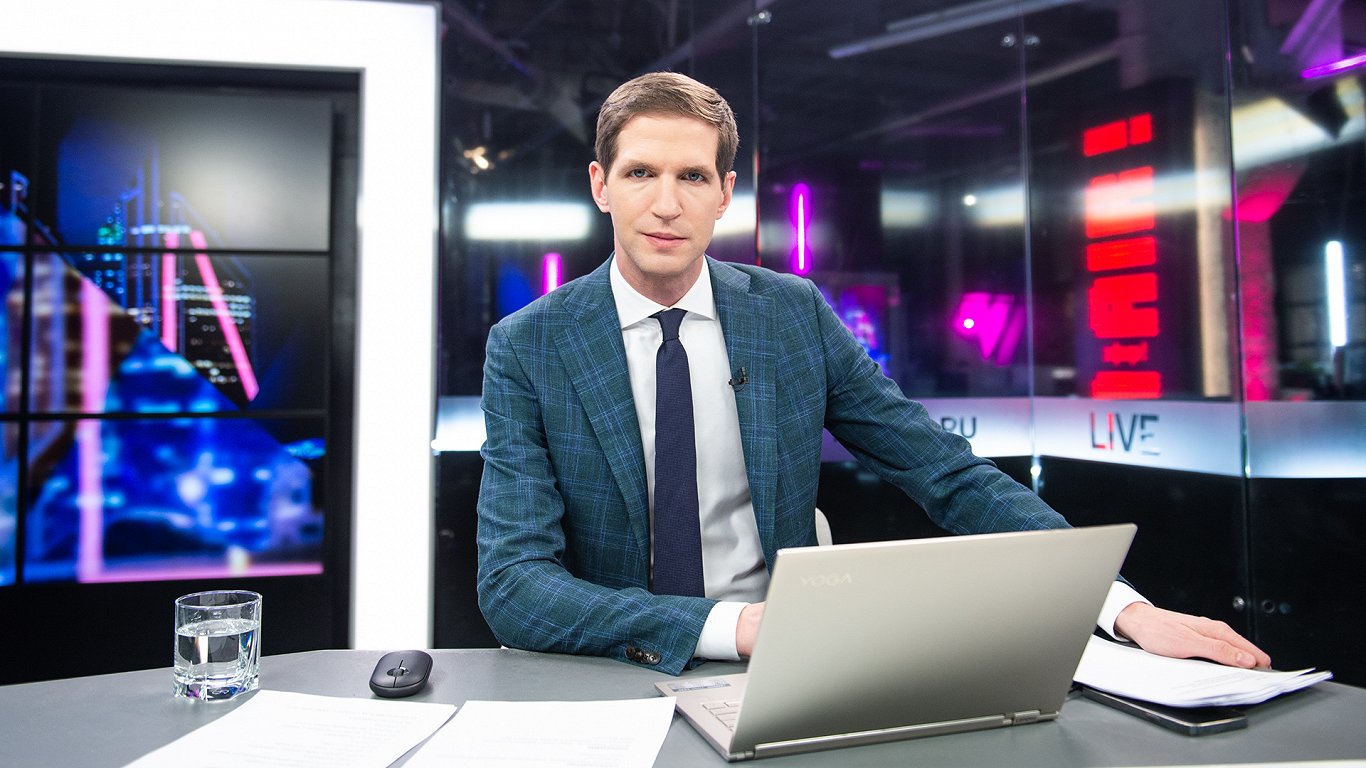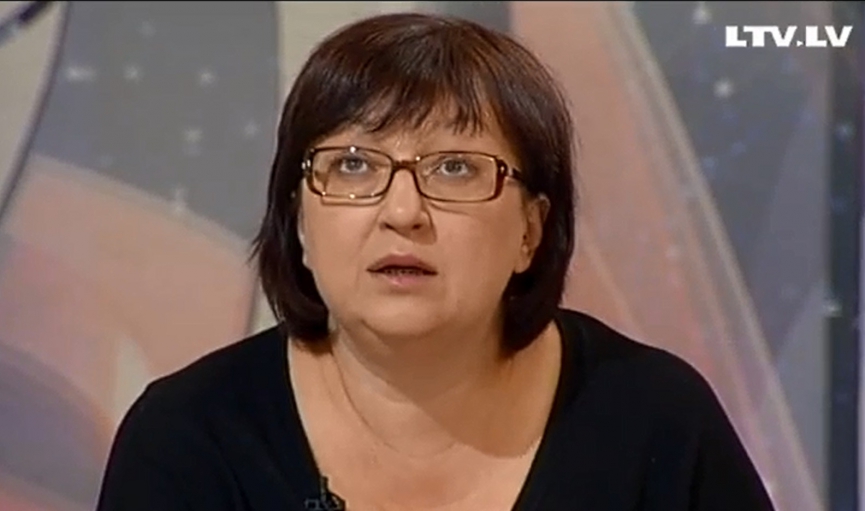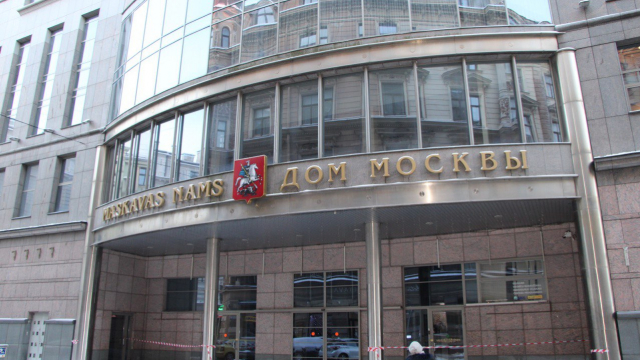After being forced out of Russia by that country's demands for all-embracing censorship and propaganda, Dozhd will return to the air gradually. First, it is planned to concentrate on broadcasting news without Moscow's censorship, and over time it is planned to expand the content.
The channel's editor-in-chief Tikhon Dzyadko spoke to Latvian Radio's Sintija Ambote about Dozhd's plans.
Sintija Ambote: "Doždj" channel had its first live broadcast this week after a four-month break, but first, tell us how you feel here in Latvia?
Tikhon Dzyadko: We feel wonderful here. I've been here many times and I love this country very much, but another thing is that in the couple of weeks since we've been here, we haven't had a chance to appreciate what we see around us, because for now we only exist between work and home. Rīga is a great city and always very stimulating. I don't know how long we'll be here now, but I hope we'll be fine here.
Tell us about the organization of the TV channel's work remotely from Rīga. What does it require of a team of journalists to report on events while in another country?
On the one hand, this is a big problem, because we always closely follow the events there, and now, being in another country, it naturally complicates our work. And it is very important to follow the situation in Russia itself and not to lose the "feel" of events and the atmosphere inside the country.
On the other hand, we are currently creating a system where our journalists will work there anonymously, because we don't know how safe it would be to work there openly. At the same time, we also remember the experience of 2020 due to the pandemic, when everyone sat at home or in the editorial office and did not go anywhere for filming, but Skype and Zoom helped us to keep in touch with interviewees. Modern technology helps a lot in our work, and it is a completely different situation.
Given the censorship laws passed in Russia regarding the subject of the war in the media, how do you yourselves get access to any independent information about what is happening inside Russia?
We have access to such information thanks to our sources. Of course, given the censorship introduced right after the start of the war in Ukraine, which has caused dozens of journalists to leave Russia, it is more difficult to get information now, but the fact that there are still people left in Russia who cooperate with us and have the opportunity to communicate on social networks, it makes this task much easier.
And Russian citizens also mostly have access to independent media content?
For now, the "YouTube" and "Telegram" platforms are not blocked in Russia, but as for alternative ways of obtaining information, people in Russia use VPN to bypass the restrictions imposed by the Russian authorities and access blocked media or social networks – "Facebook", "Twitter", "Instagram". And we know that the amount of people doing this is huge. For example, one of the main Russian news media "Meduza", which is now based in Latvia, their experience shows that the audience increased significantly after it was blocked in Russia. This means that there is a high demand for independent information and, on the other hand, it means that the Internet skills of people in Russia are also high. As for the Dozhd channel, we are still available in Russia on YouTube, but not on cable TV.
In these first days since you came back on the air, have you already made any conclusions about the audience, how it has changed?
We haven't analyzed it yet because the medium was closed for four months and now it's open, and it takes a lot of work to just let people know that we're up and running again. We will be able to analyze the trends after a month, but now we are happy that already at the start we had higher numbers than we had predicted. Of course, we will increase these numbers gradually.
In your first broadcast, you reminded your audience to write to you about topics of interest. Has there been any feedback from your viewers in the first week?
So far the feedback has been wonderful and we are very grateful. People write to us a lot, send topics and share their impressions. In the past, we also often followed what was sent to us directly by viewers and also developed news stories.
What will you mostly be reporting on now, what will the priorities be, as I understand you will be gradually adding content?
We'll just keep adding new programs. The main thing is that now our news is back on the air, so far only one bulletin per day, and there used to be much more. Everything will happen gradually, but we are already covering the most important events in the news. Of course, now and in the near future they are related to the war in Ukraine, and we also have a journalist working there, and we plan to send a few more people there.
The Dozhd channel was blocked in Russia at the beginning of March. How did your team come to this joint decision to leave the country? Were there any specific actions directed against employees?
The most important thing was these censorship laws, because after the law on the so-called "discrediting the army" or "fake news" appeared, it became clear that we had two options. Either we start working under these censorship requirements and lie to our viewers, not telling them what is really happening, and the other option was to continue working in Russia as we have been doing, and face up to 15 years in prison. We finally decided on a third option, because we realized that in a free space we can be much more useful to our viewers, our families and parents. Being free, we can continue our work and that is why we left Russia.
How many employees are here now?
For now, around 30 to 40 employees are in Latvia.
Why did you choose Latvia as one of the channel's homes?
We chose Latvia as the main work base because the work organization here turned out to be simpler, for which we are grateful to your institutions.
But also emotionally, Latvia is more comprehensible to us than the countries of Western Europe. Here, a large number of people also speak Russian, and Latvia is geographically close to Russia, and Latvia also has an interesting information space, because here is also the "news nerve" in the context of what is happening between Russia and Ukraine.
You have spent a short time here, do you have any first impressions of Latvian society and the media market?
Spending the first couple of weeks here, I can't draw full-fledged conclusions yet, but my first impression is that there is a large Russian-speaking audience in Latvia, which also received information from the official media of the Russian government, but now they do not have access to these sources, if they do not look for alternative ways of getting them. One way or another, these people are among our potential audience, which we will also try to reach, taking into account that in Latvia, the TV channel Dozhd can now also be watched via cable operators.
What do you think is the future of the Russian independent media, which have now emigrated to different countries?
I think that in the near future, unfortunately, independent media will work outside of Russia and will look for opportunities to reach their audience in Russia in different ways – it will be a partisan struggle. But I am optimistic and believe in good things. I believe that the current situation is not eternal and it will change in the medium-term perspective, but it also depends on the media.
The better they work, and if more and more people in Russia receive true information, the sooner the situation will change and journalists will also be able to return home.































